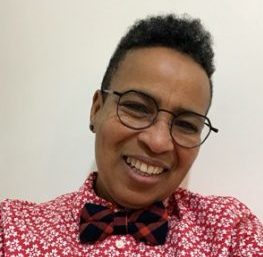A long-running annual conference that brings together stakeholders in education to evaluate educational beliefs, policies and practices will continue this year in a virtual format.
The Faculty of Education Summer Institute, FESI 2020 – Up Close and Personal; Conversations on Anti-Oppression, will be presented as a modified version of the traditional conference in a five-part webinar series with an action component.

“As is the tradition with this conference, FESI 2020 will continue to challenge and question long-held educational beliefs, policies and practices that have normalized inequities in education,” said Assistant Professor Vidya Shah, who is also a member of the FESI organizing committee. “FESI 2020 has and will continue to address the ways in which anti-Blackness permeates our thinking and practice in education. Given the heightened global awareness of anti-Black racism, spurred by the unconscionable deaths of many members of the Black community, we recommit to centering the experiences and aspirations of Black students, families and communities in support of Black life.”
This year, organizers hope to engage participants in conversations on anti-oppression to move beyond theoretical learning. The series will kick off with the central actionable question, “How might a critical, community-centered approach to design thinking support decision-making, accountability and transparency for schools and school boards in Ontario?”
The first of the five-part webinar series will run Aug. 19 from 7 to 8:30 p.m. with “Designing for/with Criticality and Community.” Shah will guide the questions “Who and what influences how you think about curriculum, activism, policies and structures in the education system?” and “How might you enhance your decision-making skills to better serve students who are most marginalized in the system?”
Join in for this free 1.5-hour webinar where anti-racism and community meet design thinking – a framework to solve complex problems with innovative solutions. Speakers Kimberley Tavares, Dori Tunstall and Natalie Wood will guide participants through action-oriented processes to disrupt longstanding patterns of educational inequities. The session will be moderated by Shah.
- Kim Tavares
- Dori Tunstall
- Natalie Wood
Tavares is an education officer, cross-appointed to the Education Equity Secretariat and the System Evidence and Design Branch, in the Ontario Ministry of Education. She serves as an educational policy and systems advisor and the equity and literacy lead, respectively. She has been seconded from a vice-principalship in the York Region District School Board, and prior to this was an equity officer in the York Region Board serving students of African and Caribbean heritage. Much of Tavares’ work in the ministry is to develop innovative tools and resources that work to dismantle the systemic barriers faced by many students in the Ontario education system.
Tunstall is a design anthropologist, public intellectual, and design advocate who works at the intersections of critical theory, culture, and design. As dean of design at Ontario College of Art and Design University, she is the first black and black female dean of a faculty of design. She leads the Cultures-Based Innovation Initiative focused on using old ways of knowing to drive innovation processes that directly benefit communities.
Wood is a professor in the Service Work Program (SSW) at George Brown College (GBC). She is a social innovation specialist, co-founder of the GBC Social Innovation Hub who designs and performs change within institutions and communities; a PhD student using her research time to challenge the devastating impact of anti-Black racism through documenting and developing Afro-Caribbean diasporic-inspired community organizations and models of empowerment, healing and inclusion; and, an award-winning visual and multi-media artist.
Shah is an educator, scholar and activist committed to issues of equity and racial justice. She is an assistant professor in the Faculty of Education at York University and her research explores anti-racist approaches to educational leadership and school district reform. Shah has worked in the Model Schools for Inner Cities Program in the Toronto District School Board (TDSB) and was a teacher in the TDSB. She is also actively involved in community initiatives.
“Our education system was founded on colonialism, white supremacy and other intersecting forms of oppression. If left unexamined, we continue to perpetuate these systems of oppression in our educational structures,” said Shah. “FESI 2020 brings together community partners, educators, researchers and policy-makers to think and collectively towards disrupting these long-standing inequities.”
This webinar is for classroom educators, community partners, district leaders, education policy-makers, and members of the school community.
Register online by Aug. 17, 2020 at fesi.blog.yorku.ca. Webinar session URL will be sent once your registration has been received.
Upcoming webinars for FESI 2020 are planned to take place on Oct. 21, Feb. 17, 2021, March 24, 2021 and April 21, 2021.





